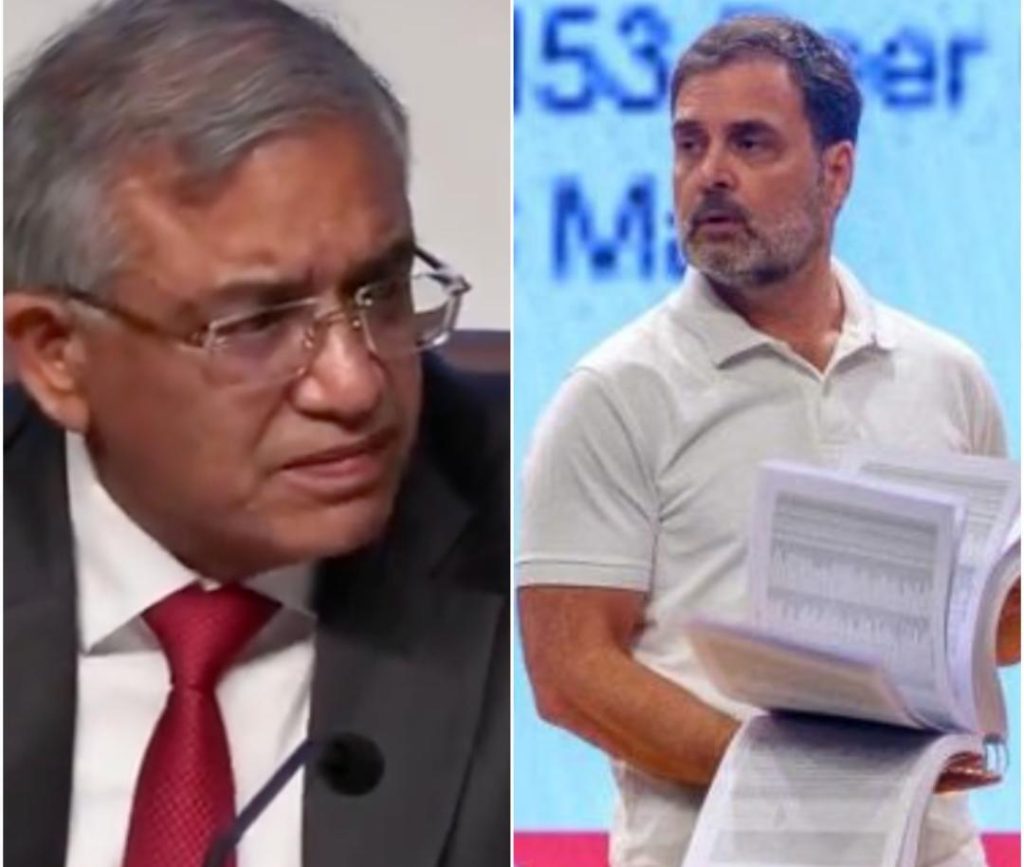
Vote Chori’ Phrase an Insult; Should We Share CCTV Footage of Mothers & Sisters Voting?: EC
The ongoing political debate in India has taken a new turn with the Election Commission of India (EC) criticizing the use of the term “vote chori” (vote theft) by Congress leader Rahul Gandhi. The phrase has been used by Gandhi to claim that the elections are rigged, but the EC has deemed it an insult to the Constitution. Moreover, in response to demands for releasing surveillance footage from polling booths, the EC has raised concerns about voter privacy.
The EC’s criticism of the “vote chori” phrase comes at a time when political tensions are running high in the country. With the general elections just around the corner, politicians are using every opportunity to gain an edge over their opponents. However, the EC’s stance is a timely reminder that the sanctity of the electoral process must be maintained at all costs.
The “vote chori” phrase has been used by Rahul Gandhi to hint that the elections are rigged in favor of the ruling party. While Gandhi has not provided any concrete evidence to back his claims, the phrase has sparked a heated debate on social media and among political circles. The EC, however, has taken a strong stance against the use of this phrase, calling it an insult to the Constitution.
“We should not use such language that hurts the dignity of the electoral process,” said Chief Election Commissioner (CEC) Gyanesh Kumar. “The Constitution is the supreme law of the land, and we should not undermine its sanctity by using such phrases.”
The EC’s criticism of the “vote chori” phrase is not without merit. The use of such language can undermine public confidence in the electoral process and create divisions among citizens. Moreover, it can also lead to a culture of mistrust and suspicion, which can have long-term consequences for democracy.
In addition to criticizing the “vote chori” phrase, the EC has also raised concerns about the release of surveillance footage from polling booths. There have been demands from some quarters for the EC to release CCTV footage of voters casting their ballots, ostensibly to prove that the elections are free and fair. However, the EC has refused to comply with these demands, citing concerns about voter privacy.
“Should we share the CCTV videos of any voter, including their mothers, daughters-in-law?” asked CEC Gyanesh Kumar. “We cannot compromise on the privacy of voters. The EC is committed to protecting the secrecy of the ballot, and we will not compromise on this principle.”
The EC’s stance on the release of surveillance footage is also justified. The secrecy of the ballot is a fundamental principle of democracy, and any compromise on this principle can undermine public confidence in the electoral process. Moreover, the release of CCTV footage could also lead to unintended consequences, such as the identification of voters and the creation of a culture of surveillance.
In conclusion, the EC’s criticism of the “vote chori” phrase and its refusal to release surveillance footage from polling booths are both justified. The use of such language can undermine public confidence in the electoral process and create divisions among citizens, while the release of CCTV footage could compromise voter privacy and undermine the secrecy of the ballot.
As the general elections approach, it is imperative that political leaders and citizens alike maintain a respectful tone and avoid using language that can undermine the electoral process. The EC’s role is to ensure that the elections are free and fair, and it is crucial that it is given the necessary support and cooperation to discharge its duties effectively.






